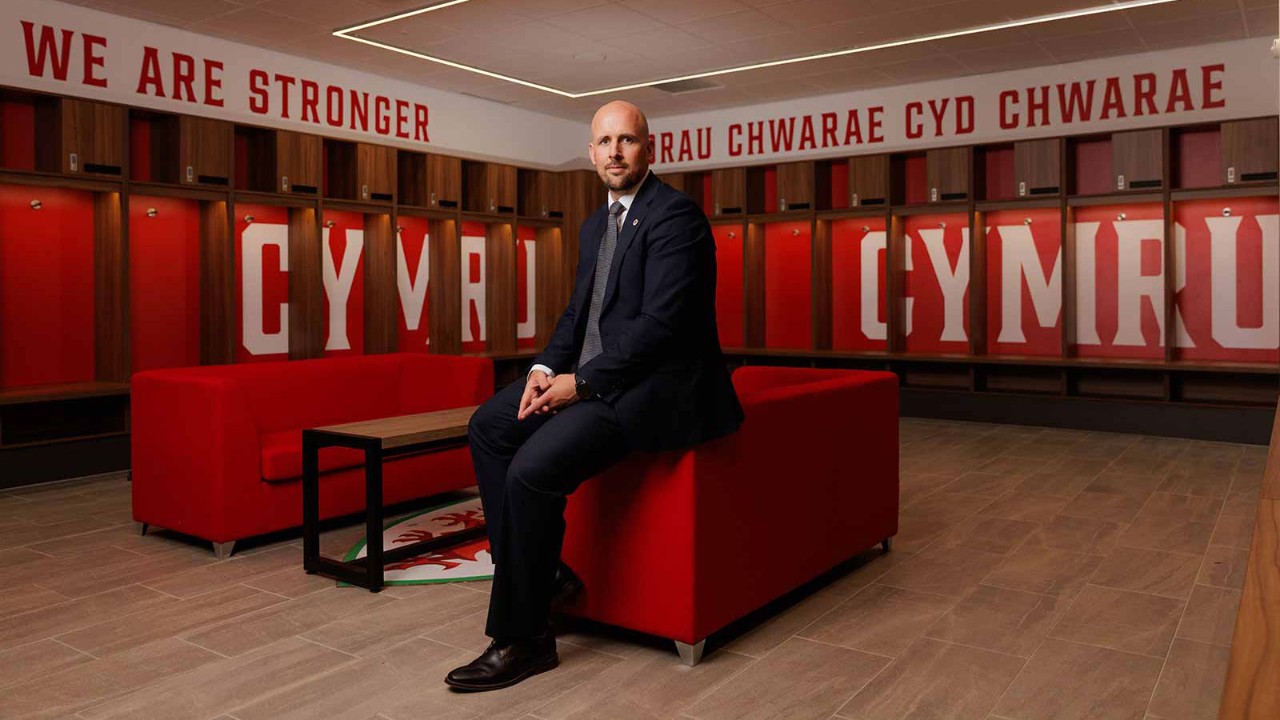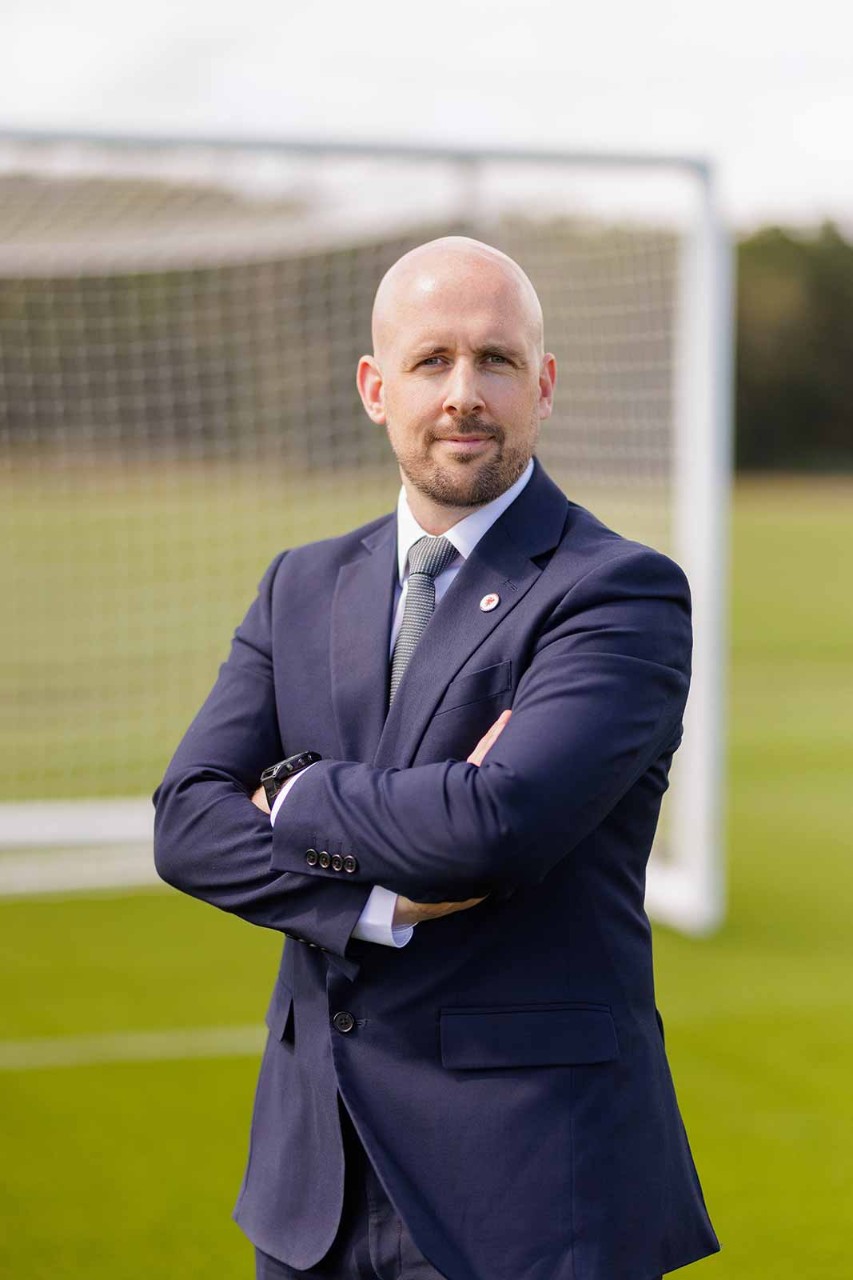
For a small nation, Wales tends to punch above its weight when it comes to football – which is both a blessing and a curse. ‘Our problem is that we live right next door to the big animal that is the Premier League,’ says John Young ACCA, CFO of the Football Association of Wales (FAW).
‘We’ve only got three million people, so when looking at our own domestic league, we’re never going to get the attendance of Old Trafford or Anfield. We’ve set a target of increasing our average attendance to 1,000, as laid out in the Cymru Premier League strategy. Being realistic is the first and most important step, otherwise you’re fighting against things you can’t change.’
‘The best thing for Welsh players is to play in the English system; that’s where the infrastructure currently is’

That means, for example, being realistic about what is best for young Welsh players. ‘As things stand, the best thing for Welsh players is to play in the English system. This doesn’t look great from an optics point of view, but that’s where the money and the infrastructure currently are,’ Young says. ‘We think that the best thing for them – and for us as an association – is to get our young talent into academies in Swansea, Cardiff, Newport or Wrexham and hope they move on to play for a Premier League club.’
Leading ambition
The FAW is the third-oldest association of 211 national football associations worldwide and a member of Fifa, Uefa and the International Football Association Board, which determines the rules of the game. Its remit – to promote, develop and regulate Welsh football at all levels – is wide-ranging. It encompasses the Wales men’s and women’s teams, the youth teams, the men’s and women’s national leagues (the Cymru League and Adran League), and a well-regarded coach education programme. It also supports grassroots club football across Wales – there are more than 900 at last count – through its Clwb Cymru platform.
Its strategic plan for 2021-26 describes the FAW’s aim of becoming ‘a leading football nation at a global and local level’, as well as making football ‘the most inclusive, accessible and successful sport in Wales’. This, of course, takes money. The key milestones for finance are to double annual revenues, consistently report annual operating profits and invest a minimum of £20m in Welsh football facilities.
The FAW’s turnover for the year to June 2023 reached £36.2m, 22% higher than the previous year. Funding comes from distributions from Fifa and Uefa following the World Cup and Euro tournaments (provided the FAW hits agreed key performance indicators including the development of youth talent and increasing participation numbers), as well as sponsorship, government funding and match ticket revenue. An important and growing revenue stream is its world-leading coach education programme, whose alumni include Mikel Arteta, Thierry Henry, Patrick Vieira and Roberto Martinez.
‘Football associations have to be sustainable because our future generations’ football provision depends on it’
Young stresses that running a successful football association is very different from running a successful league club. ‘Most football clubs are not sustainable without a very wealthy owner,’ he says. ‘Football associations have to be sustainable because our future generations’ football provision depends on it. That’s a big responsibility.’
That means sensible budgeting. ‘We budget on the assumption that we will not qualify for any tournament,’ says Young – in contrast to other European associations, which budget on the basis that they will reach at least the quarter-finals of every major tournament. ‘If you qualify you get a huge windfall – for example, when the men’s team qualified for the World Cup in Qatar, the association benefited by approximately £3m, once all associated costs had been taken into consideration. It would leave a large hole if you had budgeted for that income and failed to get it. In our case, we would have had to dip into our reserves.’
Agile approach
The national team’s success since 2016 – it has qualified for three of the past five major tournaments – has contributed to the FAW’s healthy financial position, and it currently has around £18m in reserves. ‘It means that if an opportunity comes up we can be agile because we have funds, having been run prudently in the past,’ Young says.
‘You pick up good habits from high-pressure situations’
The first thing he does every morning, he says, is check the association’s bank accounts – a habit he developed when working for the struggling south Wales steel manufacturer Liberty Steel. ‘If you’re living hand to mouth you need to know that you have enough money to buy steel that day. You pick up good habits from high-pressure situations.’
Young was appointed CFO of the FAW last year, after an exhaustive and highly competitive recruitment process. From the point the job advert first appeared, his phone pinged non-stop. ‘I had messages from friends almost immediately,’ he says. ‘It probably added to the pressure but I had to go for it; it was my dream job.’
CV
2023
CFO, Football Association of Wales
2020
Finance director, GFG Alliance (Simec Ports and Liberty Steel)
2014
Internal control manager and group finance manager, Celsa Steel
2009
Accountant, Neil Wilson & Co Charted Accountants
In the blood
As the son of a professional footballer (who played for Aston Villa and Torquay United in the 1980s) and a promising footballer himself, the chance of a senior finance role in football was ‘a full-circle moment’.
‘My father had to retire through injury in his 20s. When I was younger, looking back, he was almost steering me away from being a player because it could be such a short career,’ Young says. ‘He had a degree in physics so he did have a fallback. Looking at how slim the chances are of making it as a footballer, that was probably the best thing for me too. It all worked out.’
‘We want to invest in grounds in north Wales so that the U19s Euros 2026 leaves a legacy’
Young’s day could include anything from meeting with match officials to discuss the use of VAR, to negotiating the price of a chartered plane to get the national team to a game. And then there’s the prospect of Wales hosting the U19s Euros 2026 and hosting key games, including the opener in the 2028 Euros: ‘There is a lot of work to do in terms of choosing grounds and making sure the finances stack up. We want to invest in grounds in north Wales so that the tournament leaves a legacy. Tournaments come and go so quickly and cost a lot, so that’s vital.’
Co-hosting the next Euros will bring in hosting fees, ‘plus there are additional qualification spaces allocated to the hosts. That gives us some certainty around future revenues.’ That money will fund the growth and development of football across the country.’
In 2016, two-thirds of the population of Wales watched the men’s team reach the semi-finals of the Euros; the FAW is aiming to secure up to 150,000 participants in the game by 2026 – or 5% of the entire nation. The potential for the future is there to see.



